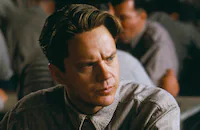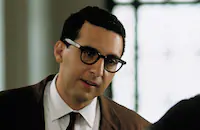Jungle Fever
Brief Synopsis
Cast & Crew
Spike Lee
Lonette Mckee
Steven Randazzo
Diane Barere
Alvin Rogers
Gina Mastrogiacomo
Film Details
Technical Specs
Synopsis
The story of a romance between a young, married African-American architect from Harlem and an Italian-American woman from Bensonhurst, and the repercussions it has on their respective social circles.
Director

Spike Lee
Cast

Lonette Mckee
Steven Randazzo
Diane Barere
Alvin Rogers
Gina Mastrogiacomo
Anthony Nocerrino
Charles Scorsese
Theresa Randle
Mamie Louise Anderson
Melissa Meel
Talese Harris
Charles Libove
Gregory Komar
Miguel Sandoval
Jue Yao
Franc D'ambrosio

Brad Dourif
Danielle Coleman

Ruby Dee
Phyllis Yvonne Stickney
Charlie Murphy
David Dundara
Ethel Abelson
Tyra Ferrell
Dale Stuckenbruck
John Pintavalle
Clay Ruede

Ossie Davis
Suzanne Ornstein
Fred Zlotkin
Annabella Sciorra
Curtis Atkins
Wesley Snipes
Ming Yeh
Bob Stewart
Steve Berrios
Elliot Rosoff
Sanford Allen
Ricky Aiello
El-shah Muhammad
Carol Buck
Ewart Lauder
Richard Edson
Lesa Terry
Regis Iandiorio

Tim Robbins
Catherine Scorsese

John Turturro
Eileen Folson
Winterton Garvey
Larissa Blitz
Michael Imperioli

Spike Lee
Scott Rosenstock
Debi Mazar
Suzanna White
Myra Segal
Stanley G Hunte
Joseph Giammarino
Scot Anthony Robinson
Anne Callahan
Cecelia Hobbs Gardner
Bob Adrian
Bruce Rogers
Melvin Bethea
Frank Vincent
Doug E Doug
Frank Esposito
Joseph Diamonte
Yong-yan Hu
Gerald Tarack
Carmel Malin
Ellen Hassman
Marion Pinheiro
Lou Ann Montesi
Randolph May
Veronica Webb
Kenneth Gordon
Joseph D'onofrio
Sue Evans
Karen Griffen
Sandra Billingsloa
Diane Monroe
Averell Curtle
Bruce Wang
Yvette Brooks
Veronica Timbers
Michael Badalucco
Nick Turturro

Halle Berry
Pamala Tyson

Anthony Quinn
Barbara Bogatin
Joseph Malin

Samuel L. Jackson
Gayle Dixon
Yuri Vodovoz
Shawn Lowenthal
Queen Latifah
Richard Henrickson
Barry Finclair
Alvin Mccall
Marilyn Nelson
Crew
Lee Adams
Kaseem Aiken
Stuart Allen
Robert M Andres
Albert Aquino
Jacqueline Arnot
Jerome Ashby
Antony Baldasare
Jeff Balsmeyer
Gerald Barclay
Jerome Bell
Leonard Bembry
Charles Bennis
Martin Bernstein
Donna Berwick
Terence Blanchard
Terence Blanchard
Katherine Bloss
Ron Bochar
Clifford R Booker
Dwayne Bouie
David Boulton
Nancy Boytos
May H Brahe
Kimberly Brewer
Kimberly Brewer
Richard Brice
Wanda Brooks
Alfred Brown
Christopher Brown
Erwin Brown
Garrett Brown
Johanne Brown
Rasheed Brown
Robert Brown
Jennifer L Bryan
William Buckman
Keith Bunting
Bill Butler
Calvin Byrd
Jeff Byrd
Joseph Caffrey
John Calling
Michael Canosa
Shari Carpenter
Ruth Carter
Lawrence Casey
Idreana Causby
Malcolm Cecil
Constance Cherry
Larry M. Cherry
Ted Churchill
Darrol Clark
Rodney Clark
James Cleveland
James Collins
Robert Collins
Brendan Connolly
Lorenzo Contessa
Austin Conyers
H. H. Cooper
Jeffrey Cooper
Marcus Copeland
Tom Costabile
Marko Costanzo
Pierre Cottrell
Aaron Cox
Lamont Crawford
Richard Crudo
Terry Cullum
Rocco Curatolo
Sara D'allesandro
Jean Dane
Adon Davis
Lee Davis
Troy Davis
Victor Dejesus
Louis J Delsarte
Pam Demetruis
Val Desalvo
Anthony Dewitt
John R Dexter
Ernest Dickerson
Lyle Dickey
Rena Dillon
Keiko Doguchi
Liza Donnell
Robert T Donovan
Laura Dorsey
Ervin Drake
Ronald Drogan
Diann Duthie
Robert Dwyer
Rudolph Eccleston
John Edler
Michael Ellis
Robin Eubanks
Robert Featherstone
Chris Fielder
James Flatto
Flavor Flav
Tom Fleischman
Frank Fleming
Randy Fletcher
Kevin Flowers
Susan D Fowler
Francesa Freeman
Stephanie Fricker
Children's Gallery
Anthony Galloway
Darryl Ganious
Kirk Gardner
William K. Gaskins
Michael Gaynor
James Geyer
Anika Gibbons
Ted Glass
Jeffrey L Glave
Kevin Golden
Sonia Gonzalez
Ponce Granger
Chey Green
Simone Greggs
Randall Gregiore-bess
John Grimolizzi
Sarah Gyllenstierna
Juliet Haffner
Vaughn Halyard
Vaughn Halyard
Oscar Hammerstein Ii
Emil Clayton Hampton
R R Hanlan
Sir Roland Hanna
Jennie Hansen
Andy Harris
Van A. Hayden
Ronald M Haynes
Russell Haynes
Gus Hein
Sandra Hernandez
Damien Heyward
Daniyel Heyward
Terraine Hicks
Tracey Hinds
Milt Hinton
Hollis James Hoff
Patrick Hogan
Bradford L Hohle
Garvin Holder
Patricia Holmes
Preston L. Holmes
Jerome F. Holway
Charles Houston
Duane Howard
Howard Howard
Rosa Howell-thornhill
Valerie Hughes
Jason Hunt
Jonathan Iverson
Mahalia Jackson
Mahalia Jackson
Anthony L Jamison
Debra D Jeffreys
James Jelardi
Desiree Jellerette
Gary Jennings
Keith John
Brian Johnson
Cliff Johnson
Kristen M Johnson
Bruton Jones
Frank Jones
Kelvin Jones
Mark Jones
Beulah Jones-black
Jerry Kadar
David Kadow
Sheldon Kaplan
Pamela Katz
Teri Kennedy
Frank Kern
Jon Kilik
Jimmie Kimbrough
Courtney King
Gregory King
Eric Barry Klein
Richard Kornak
Joyce Kubalak
Tom Kudlek
Tom Kudlek
Kevin Ladson
Lamond Lane
Robert Lapine
Charles Laplaca
Spencer Lawrence
Bill Leavey
Harry Leavey
Jim Leavey
Carl Anthony Lee
David C. Lee
Film Details
Technical Specs
Articles
Ossie Davis (1917-2005)
He was born Raiford Chatman Davis on December 18, 1917 in Cogdell, Georgia. His parents called him "R.C." When his mother registered his birth, the county clerk misunderstood her and thought she said "Ossie" instead of "R.C.," and the name stuck. He graduated high school in 1936 and was offered two scholarships: one to Savannah State College in Georgia and the other to the famed Tuskegee Institute in Alabama, but he could not afford the tuition and turned them down. He eventually saved enough money to hitchhike to Washington, D.C., where he lived with relatives while attending Howard University and studied drama.
As much as he enjoyed studying dramatics, Davis had a hunger to practice the trade professionally and in 1939, he left Howard University and headed to Harlem to work in the Rose McClendon Players, a highly respected, all-black theater ensemble in its day.
Davis' good looks and deep voice were impressive from the beginning, and he quickly joined the company and remained for three years. With the onset of World War II, Davis spent nearly four years in service, mainly as a surgical technician in an all-black Army hospital in Liberia, serving both wounded troops and local inhabitants before being transferred to Special Services to write and produce stage shows for the troops.
Back in New York in 1946, Davis debuted on Broadway in Jeb, a play about a returning black soldier who runs afoul of the Ku Klux Klan in the deep south. His co-star was Ruby Dee, an attractive leading lady who was one of the leading lights of black theater and film. Their initial romance soon developed into a lasting bond, and the two were married on December 9, 1948.
With Hollywood making much more socially conscious, adult films, particularly those that tackled themes of race (Lonely Are The Brave, Pinky, Lost Boundaries all 1949), it wasn't long before Hollywood came calling for Davis. His first film, with which he co-starred with his wife Dee, was a tense Joseph L. Mankiewicz's prison drama with strong racial overtones No Way Out (1950). He followed that up with a role as a cab driver in Henry Hathaway's Fourteen Hours (1951). Yet for the most part, Davis and Dee were primarily stage actors, and made few film appearances throughout the decade.
However, in should be noted that much of Davis time in the '50s was spent in social causes. Among them, a vocal protest against the execution of Julius and Ethel Rosenberg, and an alignment with singer and black activist Paul Robeson. Davis remained loyal to Robeson even after he was denounced by other black political, sports and show business figures for his openly communist and pro-Soviet sympathies. Such affiliation led them to suspicions in the anti-Communist witch hunts of the early '50s, but Davis, nor his wife Dee, were never openly accused of any wrongdoing.
If there was ever a decade that Ossie Davis was destined for greatness, it was undoubtly the '60s. He began with a hit Broadway show, A Raisin in the Sun in 1960, and followed that up a year later with his debut as a playwright - the satire, Purlie Victorious. In it, Davis starred as Purlie, a roustabout preacher who returns to southern Georgia with a plan to buy his former master's plantation barn and turn it into a racially integrated church.
Although not an initial success, the play would be adapted into a Tony-award winning musical, Purlie years later. Yet just as important as his stage success, was the fact that Davis' film roles became much more rich and varied: a liberal priest in John Huston's The Cardinal (1963); an unflinching tough performance as a black soldier who won't break against a sadistic sergeant's racial taunts in Sidney Lumet's searing war drama The Hill (1965); and a shrewd, evil butler who turns the tables on his employer in Rod Serling's Night Gallery (1969).
In 1970, he tried his hand at film directing, and scored a hit with Cotton Comes to Harlem (1970), a sharp urban action comedy with Godfrey Cambridge and Raymond St. Jacques as two black cops trying to stop a con artist from stealing Harlem's poor. It's generally considered the first major crossover film for the black market that was a hit with white audiences. Elsewhere, he found roles in some popular television mini-series such as King, and Roots: The Next Generation (both 1978), but for the most part, was committed to the theater.
Happily, along came Spike Lee, who revived his film career when he cast him in School Daze (1988). Davis followed that up with two more Lee films: Do the Right Thing (1989), and Jungle Fever (1991), which also co-starred his wife Dee. From there, Davis found himself in demand for senior character parts in many films throughtout the '90s: Grumpy Old Men (1993), The Client (1994), I'm Not Rappaport (1996), and HBO's remake of 12 Angry Men (1997).
Davis and Dee celebrated their 50th wedding anniversary in 1998 with the publication of a dual autobiography, In This Life Together, and in 2004, they were among the artists selected to receive the Kennedy Center Honors. Davis had been in Miami filming an independent movie called Retirement with co-stars George Segal, Rip Torn and Peter Falk.
In addition to his widow Dee, Davis is survived by three children, Nora Day, Hasna Muhammad and Guy Davis; and seven grandchildren.
by Michael T. Toole

Ossie Davis (1917-2005)
Quotes
Trivia
Miscellaneous Notes
Released in United States on Video January 16, 1992
Released in United States September 1991
Released in United States October 1991
Released in United States March 1999
Shown at Banco Nacional International Film Festival in Rio de Janeiro September 5-15, 1991.
Shown at Valladolid Film Festival October 18-26, 1991.
Stereo Surround (video)
Completed shooting December 1990.
Began shooting August 20, 1990.
Release expanded in USA June 14, 1991.
Released in United States Summer June 7, 1991
Released in United States on Video January 16, 1992
Released in United States September 1991 (Shown at Banco Nacional International Film Festival in Rio de Janeiro September 5-15, 1991.)
Released in United States October 1991 (Shown at Valladolid Film Festival October 18-26, 1991.)
Released in United States March 1999 (Shown in Los Angeles (American Cinematheque) as part of program "Out in the Streets: The Films of Spike Lee" March 15-20, 1999.)
Released in United States Summer June 7, 1991













